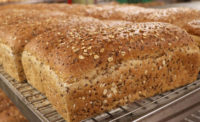Americans love pizza. In foodservice, pizza accounts for $38.5 billion in sales. And at retail, frozen pizza takes in $4.5 billion, with refrigerated take-and-bake pizzas adding in another $359.4 million, per IRI, Chicago (52 weeks ending August 7, 2016). Over 40 million Americans eat pizza on any given day of the week.
However, over the past decade, the frozen pizza category has seen its share of challenges, often with lackluster sales growth. Restaurant sales tell a similar story.
But pizza is on the upswing, and bright spots have begun to emerge. One is Palermo Villa, a family-owned Italian pizza company based in Milwaukee, WI that’s commanding a national spotlight for its new super-premium pizzas, which are far outpacing the pizza category as a whole.
According to IRI, Chicago, for the 52 weeks ending August 7, 2016, Palermo Villa’s Screamin’ Sicilian super-premium line grew 111.81 percent in dollar sales. Now the company has introduced another line with a gourmet focus and upscale ingredients, Urban Pie. These offerings complement a nicely diversified pizza lineup at Palermo Villa. For the same 52-week period, Palermo Villa saw its company-wide dollar sales increase by 44.70 percent.
And during that timeframe, the overall frozen pizza category only grew by 1.15 percent.
Clearly, there’s a new game in town, as Palermo Villa works to redefine frozen pizza, attracting new customers and breathing new life into the category.
A passion for pizza
The late Gaspare Fallucca—known as Jack, and later “Papa Palermo”—moved to Milwaukee with his wife, Zina, from a little town outside of Palermo, Sicily in the 1950s. By 1964, the couple opened a bakery, selling Italian breads, cookies and cannoli. Business grew, and in 1969, Jack and Zina opened a restaurant they dubbed Palermo Villa, which focused on home-style Italian cuisine.
The restaurant’s popularity often meant that people had to wait in line for a seat—and Jack, always focused on customer service, decided to help make the wait more pleasant. “When people were waiting for a seat at the bar, he would make these little pizzas and give them out for free,” says Nick Fallucca, vice president of marketing and R&D.
Eventually, this gesture of kindness opened the door to Jack’s next business opportunity. The popularity of the pizza helped it get onto the restaurant’s regular menu, and the Milwaukee Journal named it “Milwaukee’s Best Pizza,” notes Laurie Fallucca, chief creative officer. “A local grocery store owner, impressed with their pizza products, urged Jack and Zina to go into the frozen-food business. The rest is history.”
By 1979, Jack and Zina were producing frozen pizzas under the Palermo’s brand, and Jack was soon affectionately known as Papa Palermo.
His keen sense for superior customer service is credited with the early success of the business. “Papa Palermo is really at the foundation of everything we do,” says Laurie.
“He also wanted to make the best product possible,” says Nick.
This passion continues today.
“Our mission is to create a great pizza experience, and that’s something that we want to do throughout the range of the pizzas we produce,” says Nick, “everything from our value segment to our super-premium—we make sure that we are delivering a great experience.”
Premium growth
Introduced in 2013, Palermo Villa’s Screamin’ Sicilian craft-style pizzas have quickly grown to take the best-selling slot across the company’s range of products. “Consumers are definitely gravitating toward higher-quality pizzas,” says Nick. “They’re willing to pay a premium for products that deliver a premium experience. We hadn’t seen this trend in frozen pizza until we brought our craft pizzas, Screamin’ Sicilian and Urban Pie, to the market.” He calls the lines the craft beers of the pizza world.
The Screamin’ Sicilian line offers a higher topping load than typical frozen pizzas and features Wisconsin-made meats and cheeses. Varieties include Bessie’s Revenge (cheese), Boss Hog (Italian sausage), Spicy Clucker (jalapeño, chicken, bacon, ranch), Holy Pepperoni (pepperoni), Mambo Italiano (pepperoni, meatballs), Supremus Maximus (pepperoni, Italian sausage, fire-roasted onions and bell peppers, black olives) and Three Li’l Piggies (sausage, pulled pork, bacon, barbecue sauce).
This past March, the company launched Urban Pie Pizza Co., a super-premium craft pizza line that features unique flavors and a croissant-like crust. The line includes North End (shiitake and crimini mushrooms, truffle Alfredo, rosemary, capers, caramelized onions), Lakeview (sun-dried tomato, chicken sausage, fire-roasted yellow pepper, spinach, sun-dried tomato sauce), Little Italy (fresh mozzarella, cherry tomato, basil, pesto) and Mission District (uncured pepperoni, chicken sausage, tomatoes, basil, green peppers, onions, crimini mushrooms, roasted red bell pepper sauce).
“Palermo’s mission is to create a great pizza experience, and with that, innovation is key,” says Laurie. “Whether branded or private label, we can quickly turn concepts into successful new products.” About half of Palermo Villa’s business is in private label.
This innovation goes into the packaging, as well. “In the course of developing Screamin’ Sicilian and Urban Pie, we heard from consumers that they preferred actually seeing the tremendous amounts of premium toppings rather than the typical pictures of cooked pizzas found on most boxes,” says Laurie. “So we created a wide, clear opening on the box to show off these premium products, and consumers have reacted very positively.” All of the company’s award-winning packaging designs are created in-house.
The success of Screamin’ Sicilian led to an extension into Stromboli handheld sandwiches, currently co-packed by a partner. “We developed all the formulas in-house,” says Nick. “Then our team went to their manufacturing site and worked to adjust their manufacturing process to get us the Stromboli that we wanted.”
It was important that the Stromboli products, available in Lucky Clucker and Mambo Italiano, matched their Screamin’ Sicilian pizza counterparts in flavor profile and eating experience, notes Laurie.
Clean-label is also factoring into product development. “We are seeing a trend toward healthier eating and foods with cleaner labels,” says Nick. “Earlier this year, we reformulated our entire Primo Thin line so that it contains no artificial colors, flavors or preservatives.”
The importance of La Famiglia
At its headquarters, the company operates a bakery and restaurant called Pizzeria 3301—named after the location’s street address—that sometimes serves as a proving ground for new ideas, especially for special La Famiglia events. “La Famiglia is essentially our Palermo’s pizza lovers,” says Nick. This large, expanding group provides direct feedback on new concepts.
“By having this public space, we’re able to bring people through, talk to consumers and get a baseline to see if our concept is something that is worth further testing,” says Nick. Palermo Villa also offers daily tours, with as many as 100 people a day touring the operation.
Additionally, the company partners with a local group of young, professional millennials to gather feedback. After developing the Urban Pie line, they asked the group if they would buy the pizza instead of their existing favorite pizza brand. Their response was that they would buy it in addition to their regular brand, illustrating how expansion into super-premium pizza has cultivated incremental category growth.
Palermo Villa also uses food trucks to cultivate its customer base. “Italians have always done street food,” says Laurie. The trucks set up shop at local, regional and even some select national events.
Updated operations
 Palermo Villa operates a 250,000-square-foot facility that opened in 2006 and underwent an expansion in 2011—and there’s still room to grow. The company sells its branded or private label pizzas in every U.S. state, as well as in Canada and Mexico.
Palermo Villa operates a 250,000-square-foot facility that opened in 2006 and underwent an expansion in 2011—and there’s still room to grow. The company sells its branded or private label pizzas in every U.S. state, as well as in Canada and Mexico.
For its super-premium pizzas, the process features individual dough balls that are gently rolled and baked in a 900°F marble tile oven imported from Italy. “That oven was one of the first things that came in to this facility,” says Laurie.
While the Palermo Villa production process is largely automated, some hand-touch aspects factor into creating the super-premium pizzas. “Our Spicy Clucker has full strips of bacon,” says Nick. “You can’t apply strips of bacon through a waterfall applicator.” Bacon is also expensive, so hand application eliminates waste.
“In 2011 we also added some employee facilities,” says Laurie. This includes a large employee dining hall called Palermo Hall, with flat-screen TVs, foosball tables and pizza served 24/7. “We also added locker rooms and a health-care facility—a lot of things that just made the employee more comfortable.”
Palermo’s has an extensive sustainability program, including fuel conservation (Palermo’s is recognized by EPA as a SmartWay-certified shipper), energy conservation through use of occupancy sensors and LED lighting, waste repurposing to livestock feed, sustainable packaging, recycling, water conservation, land beautification and partnering with environmentally friendly organizations.
Giving back is part of the Palermo Villa culture. “This year, we’ll give out a million pizzas to different food banks,” says Laurie.
“The future of Palermo’s is one of growth, innovation and giving back,” says Laurie. “In order to continue to give back to our local community, Palermo’s needs to continue to grow. In order to grow, Palermo’s needs to innovate. The CPG business is ever-changing, so Palermo’s has to stay one or two steps ahead of trends and the competition. While keeping in mind that pizza remains an indulgence for many people, one of the areas where we believe it is crucial to innovate is in clean ingredients and processes. Not only is this important to the consumer, but it is important as we try to provide a healthier product. And, of course, we are always improving our automation and equipment to help us fulfill our mission to deliver a great pizza experience.”
It’s the type of corporate philosophy that would make Papa Palermo proud.













